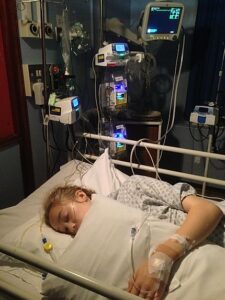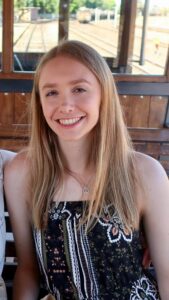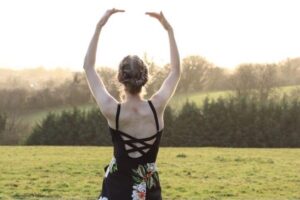Meet Scarlett Aylen
Our latest Spotlight Story comes from across the Atlantic Ocean with a fresh take on empowerment and facing the obstacles that life can throw at us. We were so excited to hear from 20-year-old university student from the United Kingdom, Scarlett Aylen, when she submitted her story. Scarlett is an example that chronic illness and health struggles affect the entire person, both physically and mentally, and she advocates each young person should be supported as an entire being. Her inner strength feeds into her organization RCASS, helping young people and their families after a scoliosis diagnosis. You learn so much through Scarlett’s story about resilience, advocacy, and finding ways to enjoy life.
It all started when I walked into a consulting room and saw my spine, looking horrifically and severely curved on a huge screen right in front of me. I was 12 and was diagnosed with severe scoliosis. I cried and cried to the point where the consultant and nurse had to let me leave the appointment without having one. I didn’t feel like a young girl, but now I see 12-year old’s and realized why my parents were so scared for me. I spent 9 months in and out of the worst time of my life, I was depressed and didn’t speak to my family. I changed.
I hid in a thick jumper and coat at school so nobody could see my deformed back, despite it being 30°C and summer. In the months leading up to the operation, my mental health continued to deteriorate, but the waiting list was preventing me from the operation I was desperate for. After the major surgery to fix the curve in my spine, the recovery was long. It took months. I was so scared to have water on my back. I remember so vividly having a panic attack when it was time to shower for the first time since the operation. It took me months to get into a swimming pool and I would insist on covering myself up. I couldn’t do sports anymore. I used to ride, swim and do triathlons competitively but I gave everything I spent my childhood doing, up. Every time I tried to exercise there was always an excuse. But I was on the road to recovery, so it was ok.
 Unfortunately, this was just the start of the problems. I thought I would just get better. Then I started to realize I couldn’t breathe. At one point, it felt like I could barely breathe at all. I also started experiencing severe anxiety on return to school and fought with panic disorder for about a year. I went to the doctors on multiple occasions and each time they told me I was just experiencing breathlessness due to anxiety. I argued and finally got a referral to a pediatrician, who allergy tested me. She said my lungs were the age of a 70-year-old but again, it was just anxiety! Through my GCSE years, I had therapy and I thought the anxiety was gone. It was just hiding. I still could not breathe. Eventually I saw a respiratory specialist who diagnosed me with restrictive lung disease and asthma. The scan showed that one of my lungs is half the size of the other and my heart is not in the same place as everyone else’s because of this, and that ¼ of my big lung wasn’t even working due to infection.
Unfortunately, this was just the start of the problems. I thought I would just get better. Then I started to realize I couldn’t breathe. At one point, it felt like I could barely breathe at all. I also started experiencing severe anxiety on return to school and fought with panic disorder for about a year. I went to the doctors on multiple occasions and each time they told me I was just experiencing breathlessness due to anxiety. I argued and finally got a referral to a pediatrician, who allergy tested me. She said my lungs were the age of a 70-year-old but again, it was just anxiety! Through my GCSE years, I had therapy and I thought the anxiety was gone. It was just hiding. I still could not breathe. Eventually I saw a respiratory specialist who diagnosed me with restrictive lung disease and asthma. The scan showed that one of my lungs is half the size of the other and my heart is not in the same place as everyone else’s because of this, and that ¼ of my big lung wasn’t even working due to infection.
However, having someone take me seriously was a huge relief. I had special respiratory physiotherapy and now take medication for my lungs. Being me, I was unlucky again.
The respiratory specialist had found a screw in a CT scan of my lungs that was dangerously close to my heart and sent me back to the spinal surgeon. He told me the operation wasn’t urgent, but that he had cancelled someone’s surgery (who waited a year to have it) and that he wanted to do it tomorrow. I woke up screaming in pain. My shoulders and neck have never been the same since. The surgeon couldn’t find anything wrong in a scan afterwards, so he sent me to a pain specialist. He basically said that I had no reason to be in chronic pain so off I go. I went to a specialist and got 3 medications to help with the pain. I have 16 Botox injections every 6 months when I can afford them, and it is the only thing that relaxes my neck and shoulders. The way I would describe the pain is severe, chronic and incredibly tense. They were constantly in spasm, which was excruciating and incredibly tiring.
By the end of my further education, I had missed out on 8 months of school and college due to pain, anxiety and fatigue. I was in so much pain and anxiety during my final exams, that I landed myself in the ER the day before my last ones from a tachycardia attack where my heart sat at 190 BPM for 3 hours. Luckily, I take medication for my heart and I am symptom free most of the time, but it again took years to diagnose since the GP dismissed palpitations and a fast heart rate as being ‘anxiety’.
 Nowadays, I focus on what my body needs. Recently, I discovered that the fatigue I’d been having for years, that kept getting worse was probably a neurological condition called narcolepsy, after the GP just told me it was probably anxiety, but then tried to pass it off as ME (chronic fatigue syndrome) after one appointment. I am now getting treatment for this which is exciting!
Nowadays, I focus on what my body needs. Recently, I discovered that the fatigue I’d been having for years, that kept getting worse was probably a neurological condition called narcolepsy, after the GP just told me it was probably anxiety, but then tried to pass it off as ME (chronic fatigue syndrome) after one appointment. I am now getting treatment for this which is exciting!
One of the perks of dealing with conditions like mine over a long period of time (over 7 years now) is that it has allowed me to learn about myself and what works for me. I understand it now. Before, I wouldn’t let myself rest if I was about to collapse from exhaustion, but now I give my body time to recover before I start doing things again. I have friends with ME and the tips they have given me for my conditions help me as well, even though I don’t have it.
If I have, what I call a ‘pain crisis’, where my pain is worse than the average daily pain I get anyway, I have learnt to stop absolutely everything. It is hard to do that when you have a lot of goals, but it is an important step towards managing your body. After I turned 17, I started realizing I couldn’t hide from doing the things my friends could do for the rest of my life. I plucked up some courage and started doing things like get back on a horse and going to the gym.
I took a gap year and decided that it wasn’t fair on young people who had to wait for scoliosis surgery to have no support before and after the operation, so I have decided to set up my own organization to help this and called it RCASS.
I want to help young people and their parents after a diagnosis of scoliosis. The end goal is to provide more support in the future and to register as a charity to help provide young people with opportunities to recover confidence after scoliosis surgery. It is still in the starting stage, but I can’t wait to work on it properly!
I took a gap year before I went to university and decided its purpose was to ‘challenge myself to lengths I had not done before’. I went travelling alone, I went up mountains, on hikes, skiing, jumping off cliffs, surfing, volunteering and many more activities. I am incredibly proud of myself, but I must admit, the pain was still there. My biggest achievement to date is building the confidence to wear a bikini on a beach or by a pool. I never used to wear a small amount of clothes, but gradually I have worked up and now I don’t browse the shops thinking about what can hide my back, I’d rather show it!
 As for my mental health, I needed the gap year and it did me the world of good. I still have some wobbly moments sometimes, and the anxiety meant I flew home 3 times on my travelling. But overall, I feel that my experiences have made me 10 times as more empathetic, understanding and positive compared to what I would have been like if nothing had ever happened to me! Another life changing moment was when I was told ‘a problem shared is a problem solved’.
As for my mental health, I needed the gap year and it did me the world of good. I still have some wobbly moments sometimes, and the anxiety meant I flew home 3 times on my travelling. But overall, I feel that my experiences have made me 10 times as more empathetic, understanding and positive compared to what I would have been like if nothing had ever happened to me! Another life changing moment was when I was told ‘a problem shared is a problem solved’.
It isn’t always easy when it comes to other young people but when I got to about 16 everyone started understanding and now I am so lucky to have incredibly supportive friends after I explain my problems to them, they help me with lots of things that I wouldn’t have help with if I didn’t share my story.
I tend to joke about my past now, and although it has been a harrowing journey, I know I am the person I am today from the experience. Time has taught me how to look after myself. Although I still have problems, I know how to deal with them both in a better mental mindset and physical one too.
